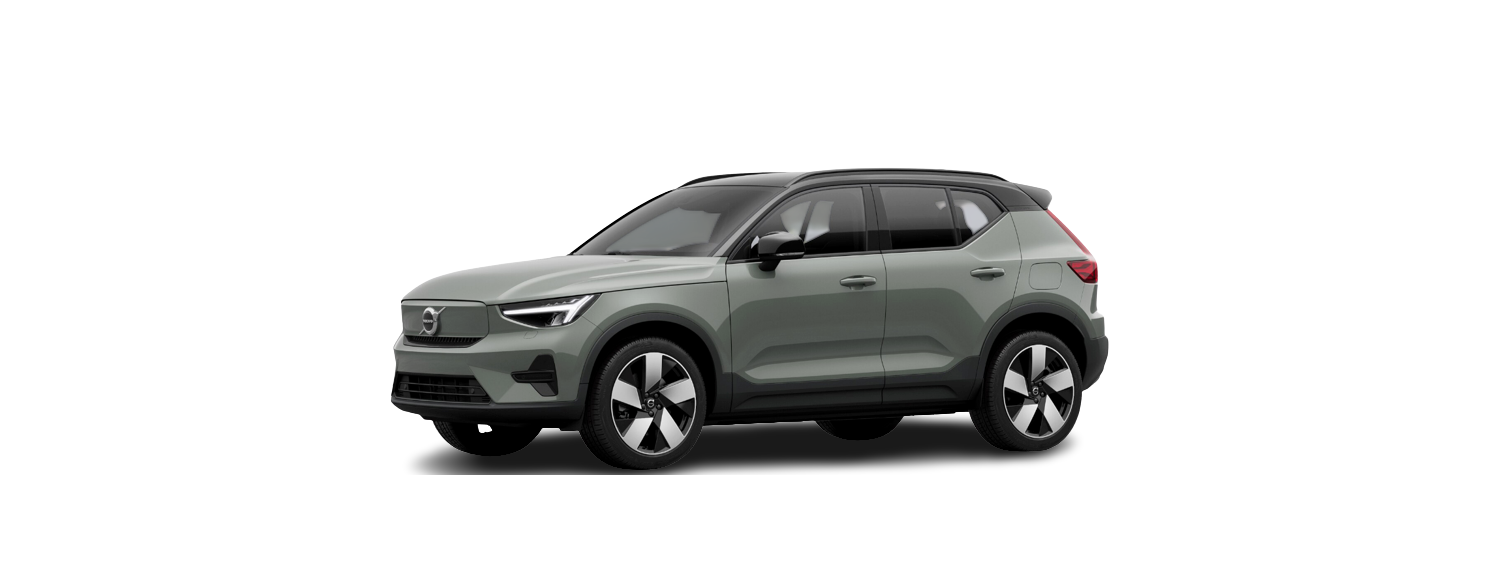2023 Volvo XC40 Recharge Plug-in Hybrid Maintenance and service

Recommended maintenance for camera and radar units
Dirt, ice, and snow covering the sensors may cause incorrect warning signals, and reduced or no function.
The following illustrations mark out the surfaces to be kept clean – on both the left and right-hand sides of the car.
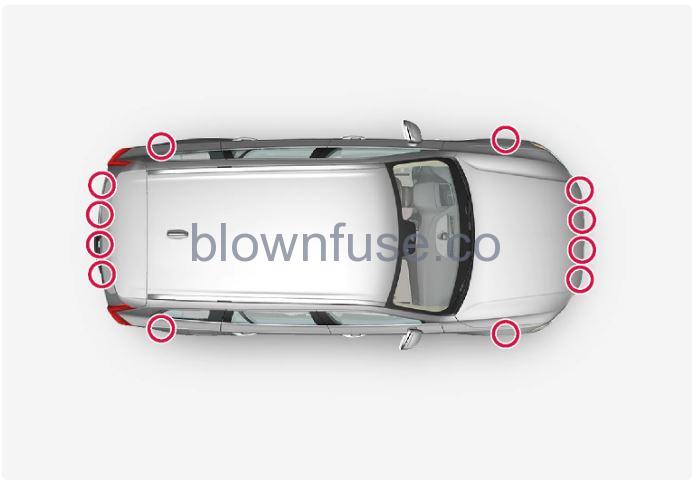 Location of the parking sensors around the car
Location of the parking sensors around the car
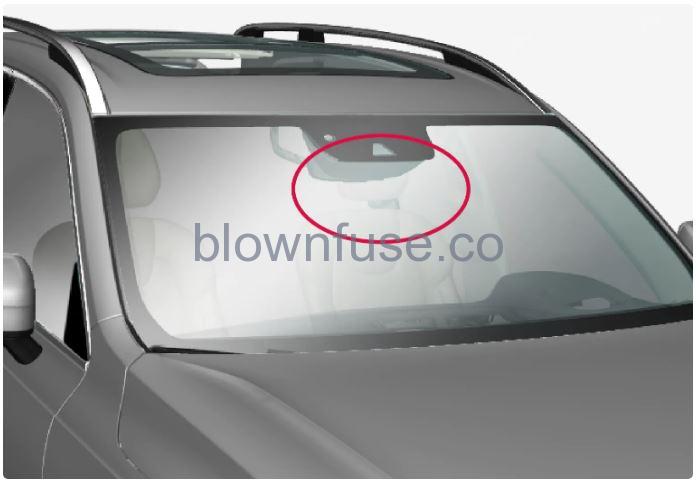 Location of front camera and radar unit
Location of front camera and radar unit
 Location of rear radar units
Location of rear radar units
- To ensure the best possible functionality, the surfaces in front of the sensors must be kept clean.
- Do not affix any objects, tape, or labels in the area of the sensors.
- Clean camera lenses regularly with lukewarm water and car shampoo – be careful not to scratch the lenses.
Maintenance of driver support components must only be performed at a workshop – an authorized Volvo workshop is recommended.
Brake system maintenance
The wear on the brake system’s components must be checked regularly.
Contact a workshop for information about the procedure or engage a workshop to carry out the inspection – an authorized Volvo workshop is recommended.
Operational disruption
Some functions have limitations in particular situations and require that certain conditions are fulfilled in order to work. The driver display and the center display may show messages in order to inform about such a situation. Find out more about fault-tracing and the limitations of various functions in related articles below.
If the car is not drivable
Activate the hazard warning flashers if the car has broken down or been forced to stop unexpectedly in a trafficked environment. Think about safety and, if possible, move the car out of danger from traffic. Put on a reflective vest and then position the warning triangle so that other road users are warned in good time. Call roadside assistance if the cause cannot be remedied at your location.
Data transfer between car and workshop via Wi-Fi
During a workshop visit, your service technician can perform fault-tracing and update software via the network.
Connection with a key
- Press three times on the lock button on the key to connect the car to the workshop’s network. Connection is normally handled by the service technician.
- When the car is connected to a Wi-Fi network, the symbol appears in the center display.
- It is not possible to use the key to connect to other Wi-Fi networks.
Warning
The car must not be driven when connected to the workshop’s networks and systems.
Raise the car
The car can be raised using a jack designed for short-term raising, using a garage jack if the car needs to be raised regularly, or by authorized workshop personnel that has access to larger lifting devices.
Volvo recommends only using the jack that belongs to the car model in question. If another jack has to be used, follow the enclosed instructions.
The normal car jack is only designed for occasional, short-term raising, such as when changing a wheel after a puncture. If the car is to be jacked up more often, or for a longer time than is required just to change a wheel, a garage jack is recommended. In this instance, follow the enclosed instructions.
- The car must not be allowed to roll while it is being raised. Apply the parking brake and set the gear selector in the Park position (P).
- Chock in front of and behind the wheels that remain on the ground using solid wooden blocks or large stones.
- When changing a wheel, use a jack intended for the car model. Use additional stands to support the car for all other work.
- Do not use a jack in poor condition. Check that the threads are lubricated and that it is free of damage and dirt.
- Check that the jack is stable. The surface underneath must be firm, flat, and not slippery.
- Never position anything between the ground and the jack, or between the jack and the car’s lifting point.
- Never allow passengers to remain in the car while the car is being supported by the jack. Make sure that they are standing in a safe location if a wheel needs to be changed in a trafficked location.
- No part of your body may be extended under the car while it is raised on the jack.
Lifting points
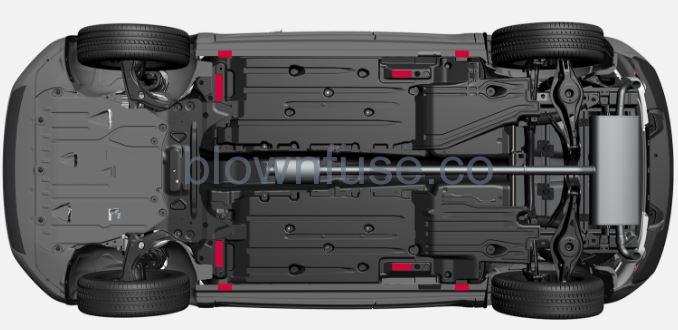 The car has outer lifting points for low-level lifting, and inner lifting points for high-level liftings, such as garage jack or lifting arms.
The car has outer lifting points for low-level lifting, and inner lifting points for high-level liftings, such as garage jack or lifting arms.
Warning
If the car is raised with a garage jack then it must be positioned under the inner lifting points. Make sure that the jack is correctly positioned so that the car cannot slide off during lifting. Make sure the head of the jack is fitted with rubber guards so that the car remains stable and is not damaged. Always use axle stands or similar when the car is in the raised position.
Lifting a wheel using a jack
Read through all instructions before beginning. Take out the tools needed before jacking up the car.
- Activate the hazard warning flashers if the car has to be raised in a trafficked location. Set up the warning triangle.
- Activate the parking brake. Select gear position P, or engage first gear if the car has a manual gearbox.
- Position chocks in front of and behind the wheels that remain on the ground. Use, for example, heavy wooden blocks or large stones.
- Position the jack under one of the car’s lifting points with the crank handle pointing straight out from the side of the car.
The positions of the outer lifting points are marked with arrows along the lower edge of the side of the car. There are special notches for the head of the jack behind the markings.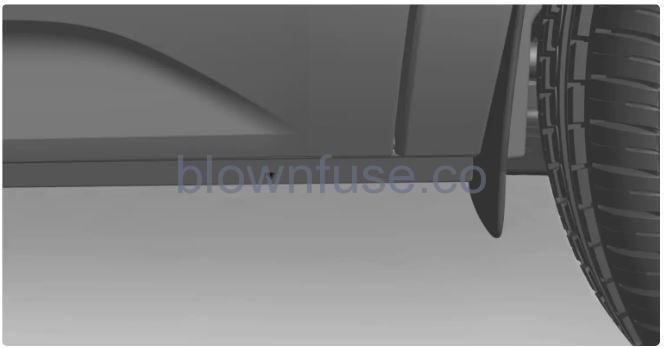
- One of the car’s four markings shows where the outer lifting points are located.
- Ensure that the jack is stable on flat firm ground and that the surface underneath is not slippery.
- Crank up the jack so that it makes contact with the car’s jacking point. Check that the head of the jack is correctly positioned in the jacking point so that the edge of the lifting point is aligned with the slot in the head of the jack.
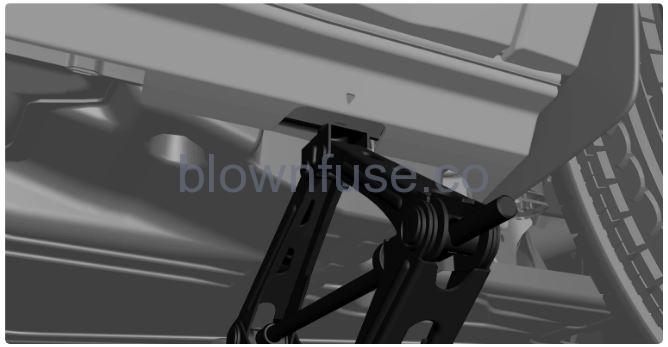
- Check that the jack is positioned completely vertically and that its arms are perpendicular to the side of the car with the crank handle outwards.
- The car is now ready to be raised.
- Raise the car just high enough to carry out the work intended.
- Lower the car using the jack immediately after the work has been completed.
- When the jack is not in use, it is recommended to be stored in its stowage space under the cargo area floor.
